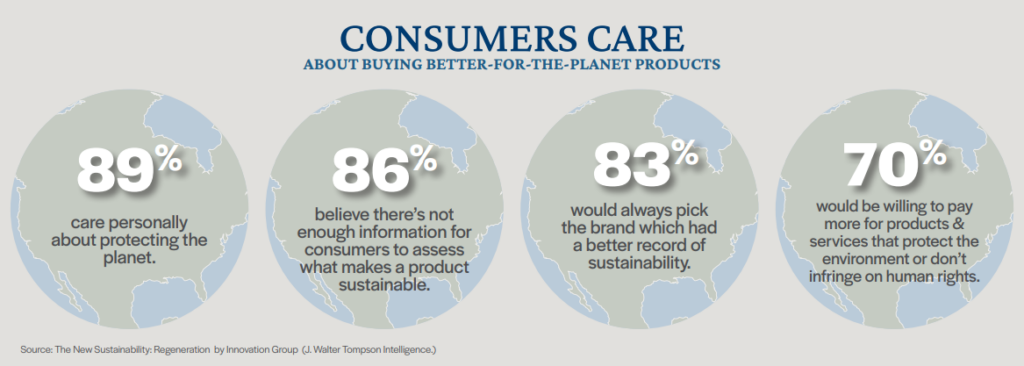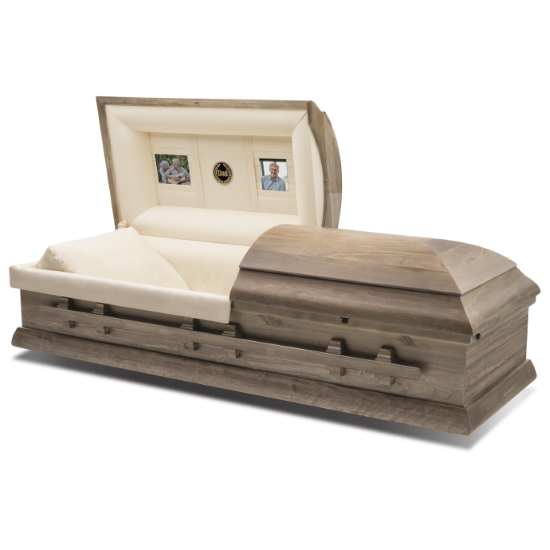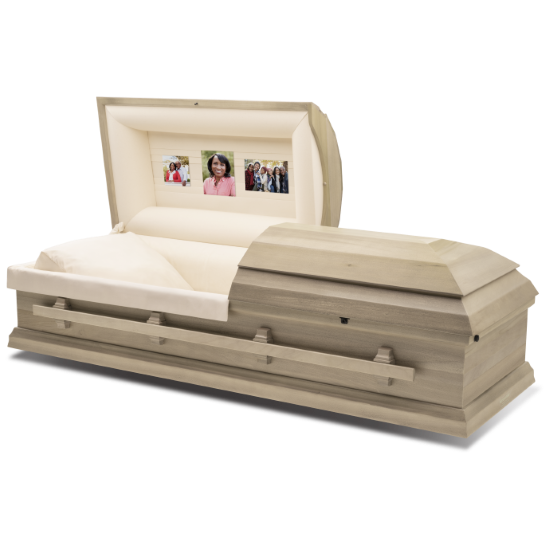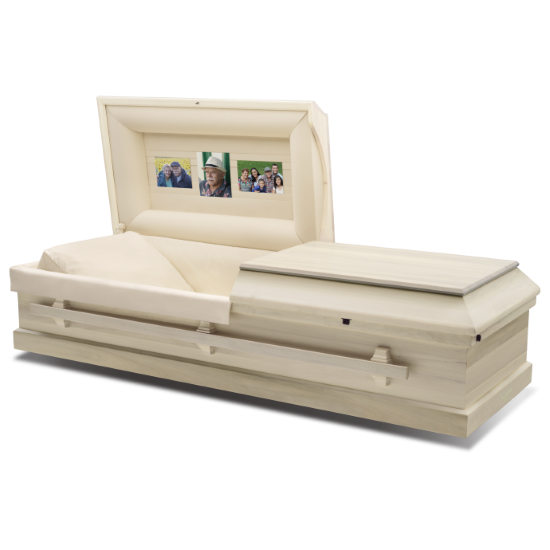This article originally appeared in the January 2024 issue of American Funeral Director, published by Kates-Boylston Publications, and is being shared with permission. Visit www.americanfuneraldirector.com to subscribe.

A Capgemini Research Institute study, for example, found that 65% of all consumers are more mindful about their overall consumption as a result of COVID-19, and 79% changed their purchasing preferences based on social and environmental responsibility concerns.
Not surprisingly, those preferences have extended into the death-care space.
Enter Batesville with its new Generations line of sustainable caskets.
Innovation has been a part of the Batesville culture for the past century, and it is also something that its new owner values.
“From the start, they have encouraged us to look at our business through the end consumer’s lens to understand what they value and are looking for in their grief journey and create solutions to fill those needs,” explained Batesville Senior Vice President and Chief Marketing Officer Jenn Parvin.
Parvin says the Generations line of sustainable caskets is an example of that. “It not only addresses a growing need in the market but aligns perfectly with our mission of helping families honor the lives of those they love, including those with a personal commitment to the environment.”
Batesville started working on the new line in early spring 2023 and had products in the field in November.
“Funeral service is built on creating meaningful experiences,” Parvin said. “Every family is unique, and our goal is to provide a full spectrum of products to meet the unique physical, emotional, intellectual, and fiscal needs of all kinds of individuals – which are everchanging.”
We recently had the opportunity to talk with Parvin about sustainability, innovation, and Batesville’s commitment to responding to families’ needs.
With so much talk about the decline of burials, what inspired Batesville to introduce a new line of caskets?
There is no question that burials have declined significantly over the past 15 years. But even with the growth of cremation, more than a million caskets are purchased by families in North America every year, and population data, death rates, and statistics from the Centers for Disease Control, Institute for Health Metrics and Evaluation, and other sources suggest that will continue for the next decade. As an industry, we need to make sure we can optimize every opportunity.
Manufacturers can’t sit still. We need to continuously adapt our products to satisfy families’ needs, whether that means building larger caskets, providing more cremation offerings, providing enhanced personalization, or creating a new category entirely.
For a growing segment of our population – reports suggest more than 60% – sustainability is more than a fad. It has become part of the core beliefs that shape their daily lives and influence purchase decisions, including when the time comes to purchase a casket. Being able to choose a product that is designed and manufactured with a sustainable mindset can bring tremendous peace of mind.
How big is the market for sustainable products?
It’s surprising how quickly this market has grown. The 2022 Sustainable Market Share Index, which analyzes national purchasing data across 36 consumer product categories, found that while sustainable products have a 17% overall market share, they were responsible for nearly a third of the growth in consumer packaged goods from 2013 to 2022, even in the face of inflation.
To better understand how consumer interest in sustainable products translates into actual sales, we reviewed research from numerous organizations before conducting our own survey to see if the same patterns hold true in funeral service.
From the third-party research we found:
• Seventy-eight percent of consumers surveyed (>10,000 respondents) agreed that environmental sustainability is important, and more than 60% have taken either moderate or significant steps to modify their lifestyle to become more sustainable. (TheRoundup.org)
• Sustainable product sales grew 2.7 times faster than products not marketed as sustainable. (New York University Stern Center for Sustainable Business, 2022 report)
• Sustainable products boast a five-year compound annual growth of 9.48%, almost double the rate for conventionally marketed goods.
The data is consistent and convincing. Consumers are increasingly interested in purchasing products made from sustainable materials and supporting companies with environmentally friendly practices. If anything, consumers wish companies would move faster to meet their changing needs.
Does the level of interest in sustainability and sustainable products apply to funeral service?
Absolutely! Our research not only validated consumers’ general attitudes toward sustainability, but it also confirmed that families are interested in purchasing sustainable caskets.
• Sixty-five percent of our survey participants say sustainability is important when making a purchase.
• Forty-two percent of participants expressed an interest in purchasing a sustainable casket for a loved one or friend.
• More than 50% said they would be willing to pay more for a sustainable product that minimizes their environmental impact.
It is rare to see this level of interest in a new product category so early, which makes it even more exciting to be able to introduce Generations sustainable caskets into the mainstream for funeral directors and families.
What makes Generations products different from traditional wood caskets?
Generations caskets have a clean, modern aesthetic with contemporary washed finishes and understated interiors that allow these products to stand out in any showroom. But sustainability is not about looks. The key differences are in the materials and processes used in manufacturing.
We chose environmentally friendly materials that are respectful of our resources and don’t negatively impact or limit their availability for future generations. From harvesting fast-growing and abundant hardwoods native to the U.S., to using all-natural cotton that is sustainably grown and distributed, water-based stains with low VOCs, and minimal metal elements, every decision is intentional with an eye toward sustainability.
There are examples throughout the manufacturing process:
• More of every tree is used in manufacturing than with other wood products to minimize waste.
• The fabric finishing process uses 100% filtered water that is recycled for reuse in each dying process.
• Water-based wash finishes don’t require special respiratory equipment for application and can be cleaned up without harsh chemicals, making them easier to work with.
Batesville collaborated with experts to select the right materials and tailor its manufacturing processes as needed without sacrificing quality, functionality, or beauty.
What can you tell us about the new Generations collection?

The Promise

The Sincerity

The Haven
The initial launch includes three products, the Promise, the Sincerity, and the Haven, multiple styles, and price points to support optimal merchandising. Soft cotton interiors, water-based stains, and contemporary wash finishes are reminiscent of today’s home furnishing trends, and as beautiful as they are environmentally friendly. All three leverage Batesville’s dual disposition design, making them an ideal choice for burial or cremation families, with increased profit potential for funeral homes.
The Promise. At the top of the line, it has a sleek domed top, mocha washed finish and intricate design details from end to end, with Family Choices photo and medallion panels to provide enhanced personalization.
The Sincerity. Refined aesthetics and trademark craftsmanship, this model features a curved plank-top design and intricate edge details and handles, highlighted by the grey wash finish and interior personalization options.
The Haven. The flat top and streamlined body accented by an ivory wash finish create a classic geometric design, with interior personalization options to accommodate personal photos.
Response to the Generations line has been extremely positive – and not just because they are sustainable. The contemporary design, natural characteristics, and value-added features appeal to a much broader audience of funeral directors and families who appreciate elegant simplicity.
Generations products are available in all Batesville customer service centers across the U.S. and Canada.
Is sustainability just a new name for “green”?
No, I think people confuse them because of the shared focus on the environment, but they are quite different, and sustainable products have a much larger pool of potential buyers with greater profit potential for funeral homes.
The green movement started in the 1990s as an alternative to traditional burials and was more focused on the preparation of the body and the manner and location of burial. Today, green practices include alternatives to chemical embalming, green burial options, eco-friendly products, such as biodegradable caskets and urns, and other things that appeal to environmentally conscious consumers.
Sustainability is a much broader concept that encompasses the processes and materials used in manufacturing, the impact on those who produce and consume products, and the long-term impact on our natural resources and ecosystem.
Generations has elements of each of these, but without any restrictions on a family’s choices for how the body is prepared, the disposition or final location of burial, or placement of cremated remains. Products are sustainably crafted with an eco-conscious mindset, using resources in a responsible way to serve the current generation’s needs without compromising our ability to serve future generations.
What are the benefits for funeral directors?
Data shows that more consumers are aligning themselves with businesses or buying products that align with their values and priorities, and as we saw in our research, that includes caskets.
Funeral directors have a special talent for recognizing what is important to families and helping them make choices that honor their loved ones in a unique way. Providing sustainable products is a strong statement to the families they serve — and to the community — that they understand and respect their values and are prepared to serve the next generation.
From an economic perspective, sustainable products also make good business sense. Consumers place a higher value on eco-friendly products. They expect and are willing to pay a premium for products that work to improve society or the environment, which can lead to higher revenue and more profit potential.
What other new products can we expect to see from Batesville in 2024?
This is an exciting time at Batesville. In early 2023, we began a new journey as a private, standalone death-care business, with a renewed commitment to growth and an investment strategy that will allow us to deliver greater value to our customers. We’re focused on three areas of growth – burial, cremation, and technology – and have a slate of projects underway to strengthen each one.
Over the last year, we added a new line of sustainable caskets, more than 50 new cremation products, including a collection of NewPointe urns, introduced a matching donation program for Living Memorial tree purchases, enhanced our free website platform, and added new functionality to Batesville Connect.
The innovations will continue in 2024, starting with the introduction of a new rental unit and additions to the Dimensions oversize line in the first quarter, both areas with growing demand. As we move through the year, there will be more new products and enhancements to our digital solutions, so stay tuned!
By Definition
The Environmental Protection Agency describes sustainable manufacturing as the creation of products through “economically-sound processes that minimize negative environmental impacts while conserving energy and natural resources.”
By the Numbers
• According to Forbes magazine, the No. 1 reason consumers purchase sustainable products and brands is a desire to help the environment.
• Seventy percent of consumers say they will be willing to pay more for products and services that protect the environment or that don’t infringe on human rights. (J. Walter Thompson Intelligence)
• Sixty-four percent of consumers would like companies to move at a faster pace to meet their changing needs. (Accenture) •